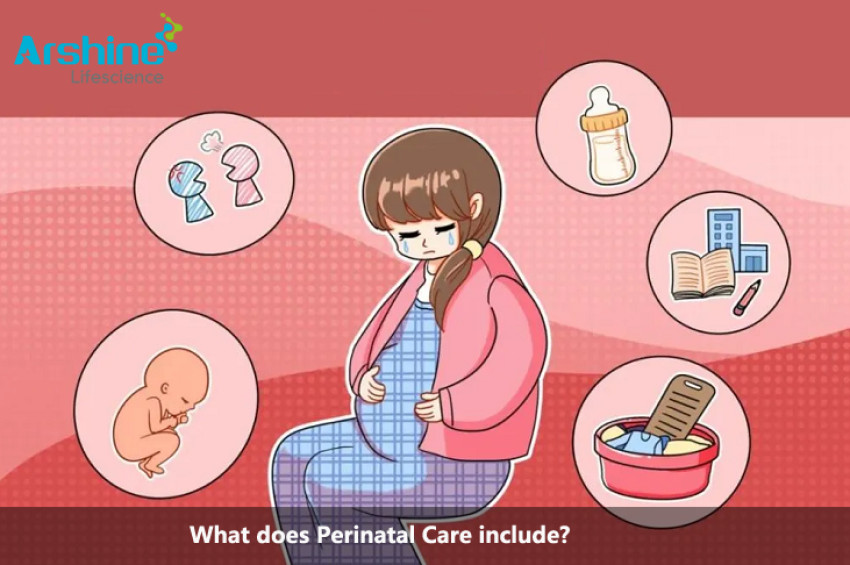
Perinatal Care: An In-Depth Overview
Perinatal care refers to the comprehensive medical and supportive services provided to women and their newborns during the perinatal period, which encompasses the late stages of pregnancy through the early weeks after childbirth. This critical phase is marked by significant physiological and emotional changes for both mother and baby, making specialized care essential to ensure optimal maternal and neonatal outcomes.
The Perinatal Period:
The perinatal period is a crucial time that starts around the 20th week of gestation (mid-pregnancy) and extends until four to six weeks after childbirth. This period encompasses two distinct stages:
Antepartum or Prenatal Period:This phase covers the duration of the pregnancy leading up to childbirth. During this time, expectant mothers receive prenatal care, which involves regular medical check-ups, monitoring of fetal development, and education on proper nutrition and healthy lifestyle choices to promote a healthy pregnancy.
Intrapartum or Labor and Delivery Period:This stage refers to the actual process of childbirth, including labor, delivery, and immediate postpartum care. It involves careful monitoring of both mother and baby to ensure a safe and successful delivery.
Postpartum Period:After childbirth, the postpartum period begins, and it typically extends for six weeks following delivery. During this time, mothers undergo physical and emotional recovery, and newborns receive specialized care and support to thrive outside the womb.
Components of Perinatal Care:
Perinatal care involves a multi-faceted approach that addresses the various aspects of maternal and newborn health. The components of perinatal care can be categorized as follows:
1. Prenatal Care:Prenatal care is an integral part of perinatal care that focuses on ensuring the health and well-being of both the pregnant woman and her developing fetus. Key aspects of prenatal care include:
Regular Check-ups:Expectant mothers attend scheduled prenatal visits with their healthcare provider, allowing for comprehensive assessments of their health and the baby's development.
Screening and Diagnostic Tests:Prenatal care includes various screening tests, such as ultrasound scans, blood tests, and genetic screenings, to assess the health of the fetus and identify potential risks or complications.
Nutrition and Lifestyle Guidance:Healthcare providers offer guidance on maintaining a healthy diet, managing weight gain, and avoiding substances harmful to the baby, such as alcohol, tobacco, and certain medications.
Education and Counseling:Expectant mothers receive education on pregnancy-related topics, such as childbirth preparation, breastfeeding, and newborn care.
Management of Complications:If any pregnancy-related complications arise, the healthcare team devises appropriate management strategies to safeguard the health of both mother and baby.
2. Intrapartum Care:Intrapartum care focuses on the labor and delivery process, ensuring a safe and comfortable experience for both the mother and baby. Key components of intrapartum care include:
Labor Monitoring:Healthcare providers closely monitor the progress of labor, assessing contractions, cervical dilation, and fetal well-being.
Pain Management:Options for pain relief during labor, such as epidural anesthesia, may be offered to mothers who desire them.
Delivery Assistance:Obstetricians, midwives, or other trained professionals assist in the delivery process, ensuring the safe birth of the baby.
Fetal Monitoring:Continuous fetal monitoring using electronic devices allows healthcare providers to assess the baby's heart rate and well-being during labor.
Emergency Preparedness:Intrapartum care teams are equipped to handle emergencies during childbirth, such as fetal distress or maternal complications.
3. Postpartum Care:The postpartum period is a critical time of recovery and adaptation for both the mother and newborn. Components of postpartum care include:
Postpartum Check-ups:Mothers attend postpartum visits with their healthcare provider to assess their physical and emotional well-being and monitor their recovery.
Breastfeeding Support:Lactation consultants and nurses offer guidance and support to mothers who choose to breastfeed.
Newborn Care:Newborns receive comprehensive care, including physical examinations, vaccinations, and screenings for developmental milestones.
Mental Health Support:Postpartum care includes screening for postpartum depression and providing mental health support for new mothers.
Contraception Counseling:Healthcare providers discuss contraception options with mothers to help them make informed decisions about family planning.
4. Neonatal Intensive Care:In cases where newborns require specialized medical attention due to preterm birth, low birth weight, congenital anomalies, or other medical conditions, neonatal intensive care may be provided. Neonatal intensive care units (NICUs) are equipped with advanced medical technology and staffed by specialized healthcare professionals to care for critically ill newborns.
5. High-Risk Pregnancy Management:For women with high-risk pregnancies due to pre-existing medical conditions or pregnancy-related complications, perinatal care involves specialized monitoring and management. High-risk pregnancy care aims to minimize potential risks and ensure the best possible outcomes for both mother and baby.
Benefits of Perinatal Care:
Perinatal care plays a vital role in promoting the health and well-being of expectant mothers and their newborns. Some of the benefits of comprehensive perinatal care include:
Early Detection and Management of Complications:Regular prenatal check-ups enable healthcare providers to identify and address potential pregnancy-related complications early on, reducing the risk of adverse outcomes.
Healthy Pregnancy Outcomes:Proper prenatal care, including nutrition guidance and lifestyle education, contributes to healthy fetal development and reduces the risk of preterm birth and low birth weight.
Reduced Maternal and Neonatal Mortality:Access to skilled and timely perinatal care significantly reduces the risk of maternal and neonatal mortality, particularly in regions with adequate healthcare infrastructure.
Facilitates Informed Decision-Making:Perinatal care empowers expectant mothers to make informed decisions about their childbirth experience, including pain management options and breastfeeding choices.
Support for Postpartum Recovery:Postpartum care addresses the physical and emotional needs of mothers during the recovery phase, promoting their overall well-being.
Promotes Early Newborn Care:Neonatal care provided immediately after birth, including routine screenings and vaccinations, ensures that newborns receive timely and appropriate medical attention.
Conclusion:
Perinatal care is a comprehensive and multi-faceted approach that addresses the health and well-being of expectant mothers and their newborns during the perinatal period. From prenatal care and intrapartum management to postpartum support and neonatal care, perinatal care encompasses a wide range of services aimed at ensuring safe and healthy pregnancies, deliveries, and early newborn care. Through the combined efforts of skilled healthcare professionals, perinatal care plays a critical role in reducing maternal and neonatal mortality and improving the overall health outcomes of mothers and babies worldwide.
https://www.arshinemedical.com/Industry-information/what-does-perinatal-care-include




